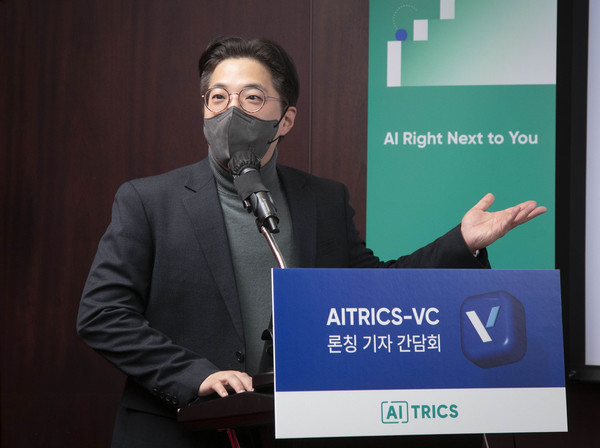"After enhancing the company's strength based on AITRICT-VC, our risk prediction solution for in-hospital emergencies, we plan to actively advance into the global market. Preparatory work is already underway, with the company undergoing U.S. Food and Drug Administration approval process for the solution."

Aitrics CEO Kim Kwang-joon said so during a news conference at L'Escape Hotel in Jung-gu, downtown Seoul, on Wednesday, to celebrate AITRICT-VC’s winning approval from the Ministry of Food and Drug Safety.
Aitrics, founded in 2016, developed AITRICT-VC under the company's motto, AI solution created by doctors for doctors.
The solution predicts the risk of an emergency by monitoring the patient's condition in real time in the hospital using 19 data points to determine the patient's abnormal symptoms.
The data points include six bio-signals (systolic and diastolic blood pressure, pulse, respiration, body temperature, oxygen saturation), 11 hematological tests (lactate, acidity, sodium, potassium, red/white blood cells, and platelets), Glasgow Coma Scale (GCS), and the patient's age.
According to the company, AITRICT-VC has proven prediction of deaths in intensive care units (ICUs) and general wards within six hours, alert of unexpected transfer to ICUs, and the risk of heart arrests and sepsis within four hours.
"AITRICT-VC is the only AI solution in Korea that predicts sepsis in general wards, death, unexpected ICU transfer, and death in ICU," Kim said. "The solution has also proven its excellence through partnerships and joint research with many Korean and foreign universities and hospitals."
Kim stressed that such studies backed the recent regulatory nod.
According to three clinical trials, which served as the background for AITRICT-VC approval from Korean regulators, the area under the receiver operating characteristic (AUROC) for major adverse events score (MACE) and sepsis in general ward settings and death in the ICU settings were 0.96, 0.87, and 0.98, respectively.
"The results showed a high accuracy compared to the National Early Warning Score (NEWS), which is an existing patient evaluation method," Kim said. "The company is also further verifying AITRICT-VC's efficacy with the Cleveland Clinic and expects more partners will emerge in the future."
During the conference, Kim also stressed that while the company's technology is mainly focused on hospitals, the company plans to expand it to nursing facilities and community health centers.
Meanwhile, Severance Hospital Pulmonology Professor Jeong Kyung-soo, who attended the press conference as a user of AITRICT-VC, highly praised the solution.
"It takes a lot of time to deploy trained medical staff in the medical field, and it takes a lot of experience and training time for a doctor actually to evaluate a patient's condition, and there was a high unmet demand in clinical settings for monitoring technology that predicts risk factors before a specific emergency occur," Jeong said. "AITRICT-VC helps medical staff prepare to respond to the situation and increase work efficiency by distributing appropriate medical resources and ultimately helps save lives."

